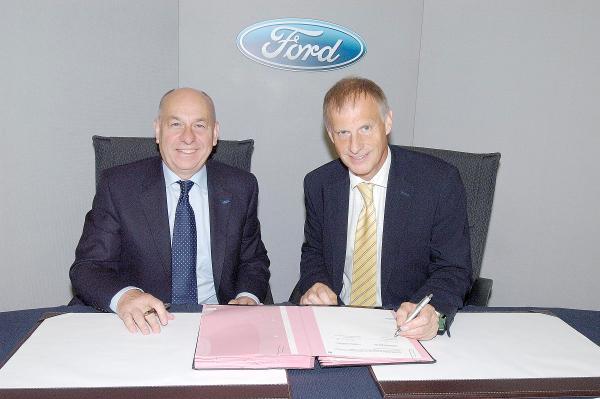
European Investment Bank Vice President responsible for the United Kingdom Simon Brooks, Business Minister Mark Prisk and Ford of Britain Chairman Joe Greenwell toured Ford’s Dunton research and development centre, the country’s largest automotive engineering facility, where engineers put vehicles and engines through rigorous testing, from extreme altitudes to crash simulators. The investment partly funded by the European Investment Bank will safeguard around 2,800 skilled jobs.
“The European Investment Bank is pleased to support Ford’s cutting-edge engine research and development in Dunton and Dagenham, and the company’s upgrading of manufacturing operations in Bridgend, Southampton and Dagenham, in particular through the European Clean Transport Facility. A new generation of low-emission engines and more fuel-efficient vehicles will develop new skills and innovation across the United Kingdom, and these new vehicles will make a significant contribution to combating climate change.” said European Investment Bank Vice President Simon Brooks.
“Ford has an impressive track record in research and development. Its investment of GBP 1.5 billion over the next five years is a great opportunity to take the lead in developing low carbon manufacturing. This backing from the Government will help to ensure the long term success of manufacturing in the UK and make sure we are at the forefront of new technologies.” said Business Minister Mark Prisk.
"This European Investment Bank loan, and the loan guarantee from the UK Government, will help to unlock up to £1.5 billion in low-carbon and environmentally friendly engine and vehicle technology investment over the next 5 years. This is a testament to the skills and capabilities of our UK workforce and demonstrates the scale of our commitment to Britain." said Ford of Britain Chairman Joe Greenwell.
The European Investment Bank’s funding for Ford supports research, development and innovation of a new generation of fuel efficient and low-emission diesel and petrol engines under the European Clean Transport Facility. Research and development of petrol engines will include additional investment in Ford’s Bridgend plant, located in a European Convergence Region.
Notes for Editors:
- The European Investment Bank is the European Union’s long-term financing institution, and provides long-term finance for capital projects promoting European economic objectives. The EIB made its first loan in the UK in 1973 and since then has lent around EUR 75bn for investment in the UK economy. In the years from 2004 to 2009, the EIB financed investment in the UK totalling some EUR 23.5bn - GBP 17.5 billion.
- European Investment Bank funding makes use of the European Clean Transport Facility, a dedicated EUR 4bn annual package approved by European Union Finance Ministers in December, 2008 that support investments targeting research, development and innovation in the areas of emissions reduction and energy efficiency in the European transport industry . In this way automotive companies of all sizes can continue crucial research, development and innovation investment using cheaper and longer-term loans backed by the 27 European Union member states. In 2009 the European Investment Bank supported 33 projects in the automotive sector with a total volume of EUR 8.2bn. Out of these, 17 projects financed in 2009 complied with objectives defined by the European Clean Transport Facility.
- Around 100,000 people are employed either directly or indirectly by Ford in product development, manufacturing, sales and marketing and service roles. The company produces around a million diesel engines a year from a 1.4 up to a high performance V8 unit. Ford currently provides 29 per cent of the UK’s automotive sector research and development.
- The UK projects to be supported cover research and development for Ford’s commercial vehicles such as the Transit and Connect vans and the development of low carbon emission diesel and petrol engines. This includes investment in production facilities for new lower carbon engines in Bridgend. Currently 25 per cent of all Ford engines worldwide and over 50 per cent of all Ford diesel engines are made in the UK.

Photographer: EIB ©To be defined
Download original

Photographer: EIB ©To be defined
Download original

Photographer: EIB ©To be defined
Download original

Photographer: EIB ©To be defined
Download original

Photographer: EIB ©To be defined
Download original